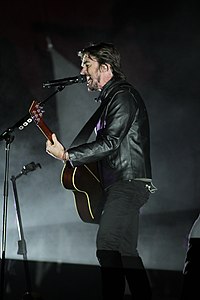
Yo tengo un sueño (I Have
a Dream) es el nombre del popular discurso más
famoso de Martin Luther King Jr.,
cuando habló poderosa y elocuentemente de su deseo de un futuro en el cual la
gente de tez negra y blanca pudiesen coexistir armoniosamente y como iguales.
Este discurso, pronunciado el 28 de agosto de 1963
desde las escalinatas del Monumento a Lincoln durante
la Marcha en Washington por el trabajo y
la libertad, fue un momento definitorio en el Movimiento por los Derechos Civiles
en Estados Unidos. Está considerado frecuentemente como uno de los
mejores discursos de la historia, y quedó en el primer puesto entre los
discursos del siglo XX según los estudiosos de la retórica. Ampliamente
aclamado como una pieza maestra de la retórica, el discurso de
King se asemeja al estilo del sermón de un
ministro bautista negro.
Apela a fuentes icónicas y ampliamente respetadas como la Biblia, e invoca la Declaración de Independencia de los
Estados Unidos, la Proclamación de Emancipación, y la Constitución de los Estados Unidos. A través
del instrumento retórico de la alusión(definido por
Campbell y Huxman (2003) como "referencia indirecta a nuestro acervo
cultural compartido, como la Biblia, lamitología griega
y romana, o nuestra historia"), King hace uso de frases y lenguaje de
importantes textos culturales para sus propios propósitos retóricos. Cerca del
comienzo King alude al Discurso de Gettysburg de Lincoln diciendo: "Five
score years ago..." una particular forma de decir "cien
años" en inglés (pues score son 20
años y 20 x 5 = 100).
Las
alusiones bíblicas también son comunes. Por ejemplo, King alude al Salmo 30:5
en la segunda estrofa de su discurso. Dice en referencia a la abolición de la esclavitud articulada
por la Proclamación de Emancipación, "llegó como un precioso
amanecer para terminar una larga noche de cautiverio." Otra alusión
bíblica es encontrada en la décima estrofa: "No, no; no estamos
satisfechos y no quedaremos satisfechos hasta que "la justicia ruede como
el agua y la rectitud como una poderosa corriente." Esta es una alusión a
Amós 5:24. King también cita de Isaías 40:4 -"Sueño que algún día los
valles serán cumbres..."
La
formación religiosa del orador se percibe claramente ya que utiliza tres veces
la expresión "hijos de Dios", habla de que "la gloria de Dios
será revelada, y se unirá todo el género humano", da ánimo a su gente diciéndoles
un mensaje cristiano "Continúen
trabajando con la convicción de que el sufrimiento que no es merecido, es
emancipador" y cerrando el discurso con ""¡Libres al fin!
¡Libres al fin! Gracias a Dios omnipotente, ¡somos libres al fin!".
Paralelismo,
o "usar la misma fraseología inicial en una secuencia de afirmaciones o
frases para agregar énfasis, orden, o clímax a una idea" (Campbell &
Huxman, 2002, p. 177), es una herramienta retórica empleada a través de todo el
discurso. Un ejemplo de paralelismo es encontrado casi al principio cuando King
insta a su público a aprovechar el momento "Ahora es el momento..."
es repetido cuatro veces en la sexta estrofa. El ejemplo más citado de
paralelismo es encontrando en la frase "Yo tengo un sueño..." que es
repetida ocho veces cuando King describe a su audiencia una imagen de un Estados Unidos de Américaintegrado y unido.



